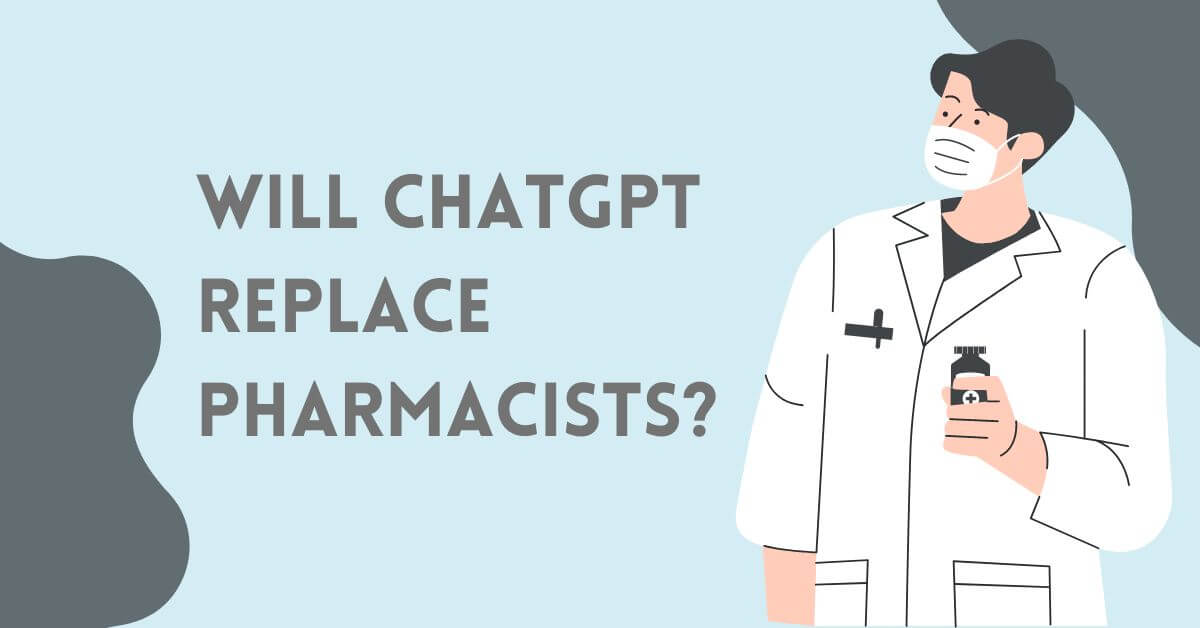
One question in the minds of Pharmacists is the probability of their jobs being snatched from them by Artificial intelligence like ChatGPT. While ChatGPT benefits pharmacists, it’s important to consider the consequences of relying entirely on this technology.
In this article, We will explore the prospects and drawbacks of ChatGPT as well as its potential to replace pharmacists.
What is the Future of ChatGPT in Pharmacy?
ChatGPT has the potential to revolutionize the field of pharmacy. It can help in medication management by analyzing patient medical data. This enables pharmacists to provide personalized medication recommendations. Let’s check how ChatGPT reacts to its future with pharmacy:
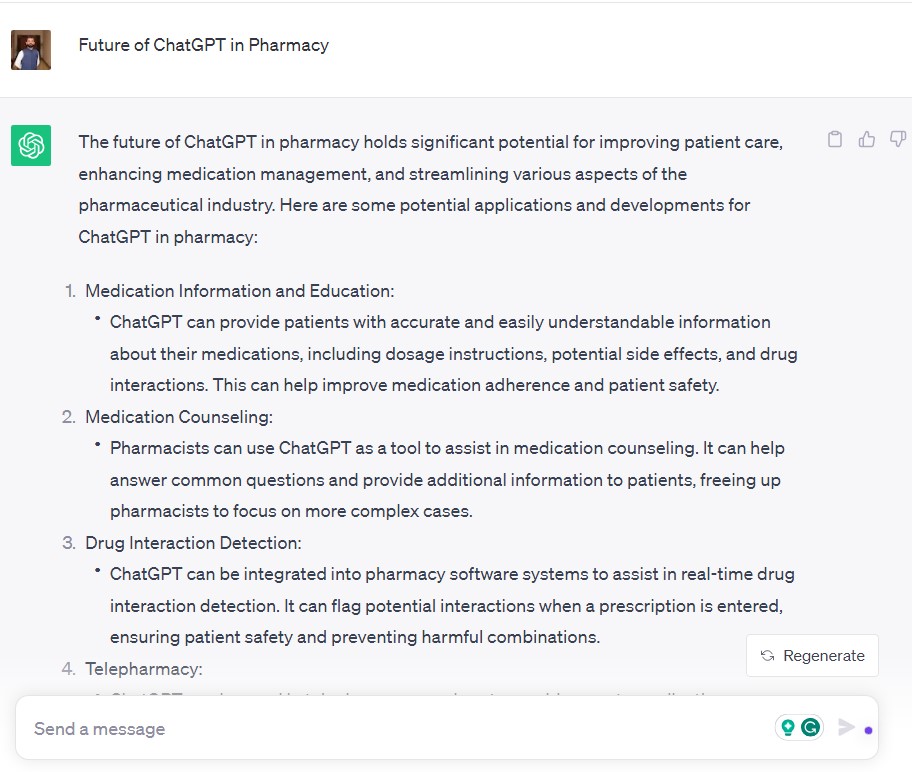
One of the areas where ChatGPT can assist pharmacists is inpatient counseling. This can be achieved by providing reliable information to ensure treatment and well-being efficacy.
Another area where ChatGPT can be of significance is drug discovery. Pharmaceutical companies can use ChatGPT to analyze vast amounts of scientific data, identify new drug targets, and predict drug efficacy and safety.
In addition, ChatGPT can be used for medication therapy management, adverse event reporting, and drug utilization reviews. By providing pharmacists with real-time access to patient data, it can enable timely interventions. Overall, the future of ChatGPT in pharmacy is bright, and it has the potential to transform the way pharmacists practice.
Can ChatGPT Replace Pharmacists?
ChatGPT can assist pharmacists in making informed decisions, providing personalized medication recommendations, and improving efficiency. However, it cannot replace pharmacists’ crucial role in building relationships with patients, managing complex medication regimens, and providing emotional support.
The use of Artificial intelligence also raises ethical and legal concerns around data privacy and accountability. Additionally, pharmacists must ensure the accuracy and safety of medications, and AI systems may not be held accountable in the same way as human professionals.
In light of the above discussion, We can say ChatGPT can enhance to the maximum, but it still won’t be able to replace the valuable work of pharmacists.
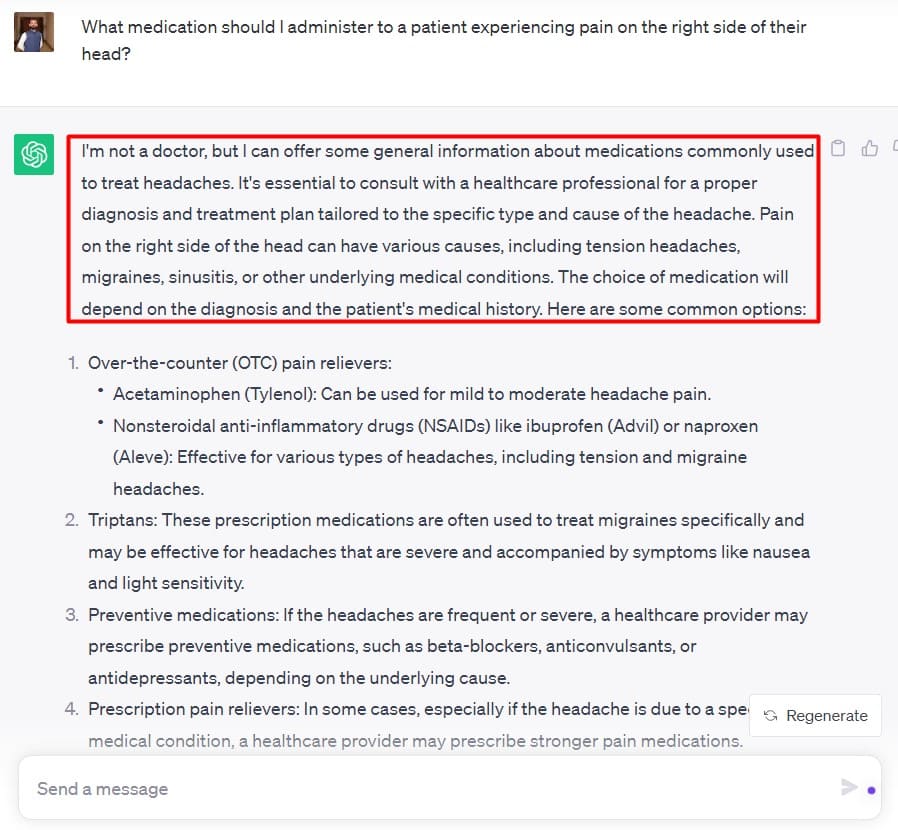
Why ChatGPT Won’t Replace Pharmacists?
As we discussed, ChatGPT has the potential to revolutionize the pharmacy field, including the valuable work of pharmacists. There are several reasons why it won’t replace pharmacists in the future.
Clinical Judgment is Required
Pharmacists are trained to evaluate a patient’s medical history and other factors to make informed decisions about medications. ChatGPT does not have the ability to make clinical judgments or decisions in complex cases.
Lack of Personalization
ChatGPT relies on algorithms we provide for medication advice, which means it may be unable to consider a patient’s unique needs and preferences.
Technical Limitations
Although ChatGPT has advanced in recent years, some technical limitations still exist, and because of those limitations, ChatGPT may not respond.
ChatGPT may not always be able to respond accurately or appropriately to complex questions or situations requiring extensive knowledge of pharmacy practices or a creative and experienced approach to problem-solving.
Ethical Considerations
The use of AI language models like ChatGPT raises ethical considerations in healthcare. Many individuals have raised concerns about using AI in decision-making, the potential for bias and discrimination, and the impact on patient autonomy and privacy.
Limited Ability to Provide Hands-on Care
Pharmacists are able to provide hands-on care, such as administering vaccines or conducting physical exams. ChatGPT does not have the ability to provide this type of care if required.
Human Touch is Irreplaceable
Pharmacists provide much more than just medication advice. They offer emotional support and can provide empathy to patients, which is something that ChatGPT simply cannot provide.
Legal and Regulatory Considerations
The use of ChatGPT in pharmacy may raise legal and regulatory considerations. For example, there may be concerns about the privacy and security of patient information, as well as the potential liability of using an AI language model in patient care.
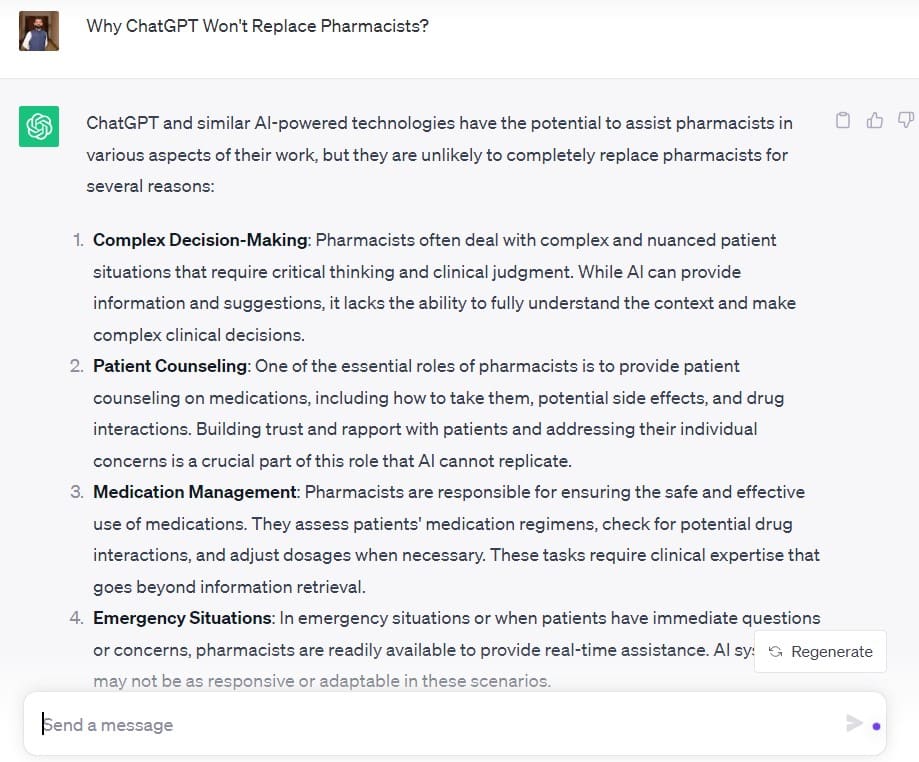
How Does ChatGPT Assist Pharmacist’s Daily Operations?
ChatGPT can assist and provide ease to pharmacists in their daily operations in a number of ways, which may include:
Medication Counseling
ChatGPT can provide medication counseling to patients by answering their questions about medications, dosages, and potential side effects. This can help free up pharmacists’ time and allow them to focus on more complex patient issues.
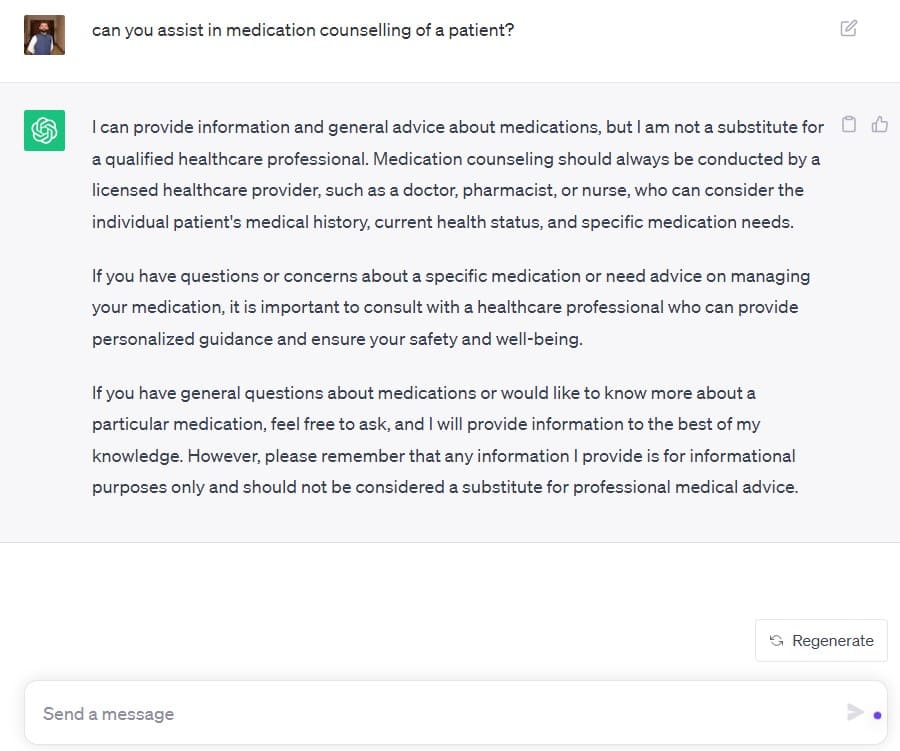
Prescription Verification
This can be carried out using ChatGPT. It’s done by checking for potential drug interactions, dosage errors, and other issues. It can reduce the risk of medication errors and improve patient safety.
Inventory Management
The ChatGPT tool can assist with inventory management by tracking medication stock levels and providing recommendations for ordering additional supplies. This can help pharmacies ensure that they always have the medications they need on hand.
Patient Education
Another area where ChatGPT is beneficial is in the education of patients by providing information about medication adherence, disease management, and lifestyle changes. This can lead to improved health outcomes for patients.
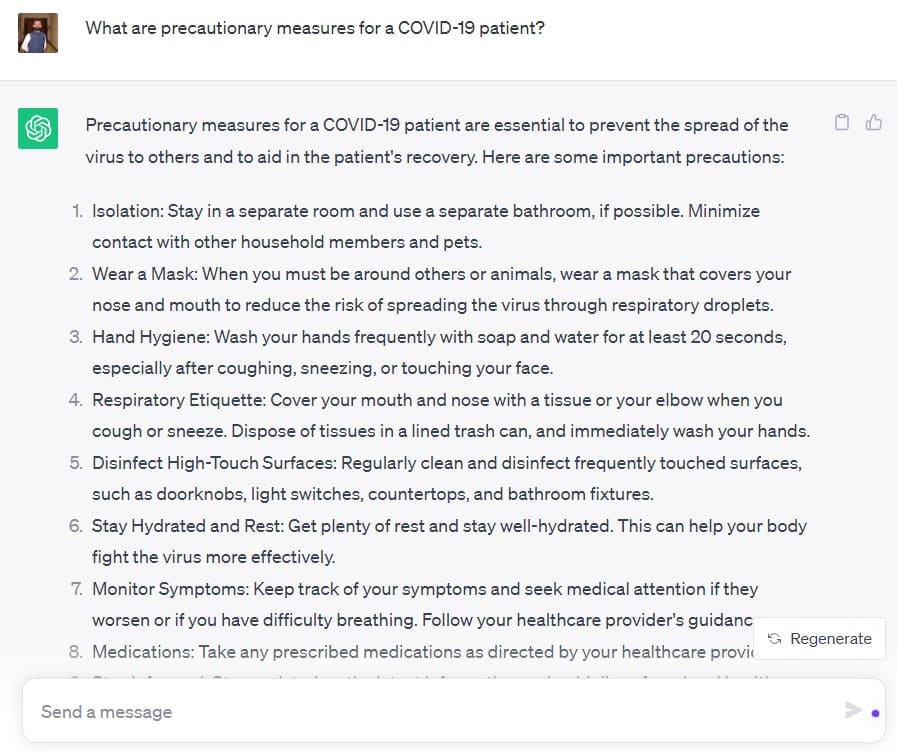
Remote Consultations
ChatGPT can assist with remote consultations, allowing patients to speak with a pharmacist from the comfort of their own homes. This can be especially helpful for patients who have difficulty traveling to a pharmacy or who prefer not to visit a healthcare facility in person.
Medication Reminders
One key area where ChatGPT can assist is in the area of medication reminders, helping patients remember to take their medications on time. This can be especially helpful for patients with chronic conditions who may need to take medications multiple times per day.
Drug Information and Research
Drug information and research are one area where ChatGPT is of great importance. It helps by providing up-to-date information about new medications, drug interactions, and treatment guidelines. This can help pharmacists stay informed on the latest developments in their field.
Language Translation
ChatGPT also helps with language translation, allowing pharmacists to communicate with patients who speak languages other than English. This can help ensure that all patients receive the appropriate level of care and attention, regardless of their language background.
What are the Limitations of ChatGPT in Pharmacy Practice?
While ChatGPT has the potential to be a valuable tool in pharmacy practice ease, there are also limitations to its use. Here are some of the key limitations:
Lack of Personal Interaction
One of the limitations of ChatGPT in pharmacy practice is the lack of personal interaction with patients. ChatGPT is an artificial intelligence system, which means that it lacks the empathy and personal touch that a human pharmacist can provide.
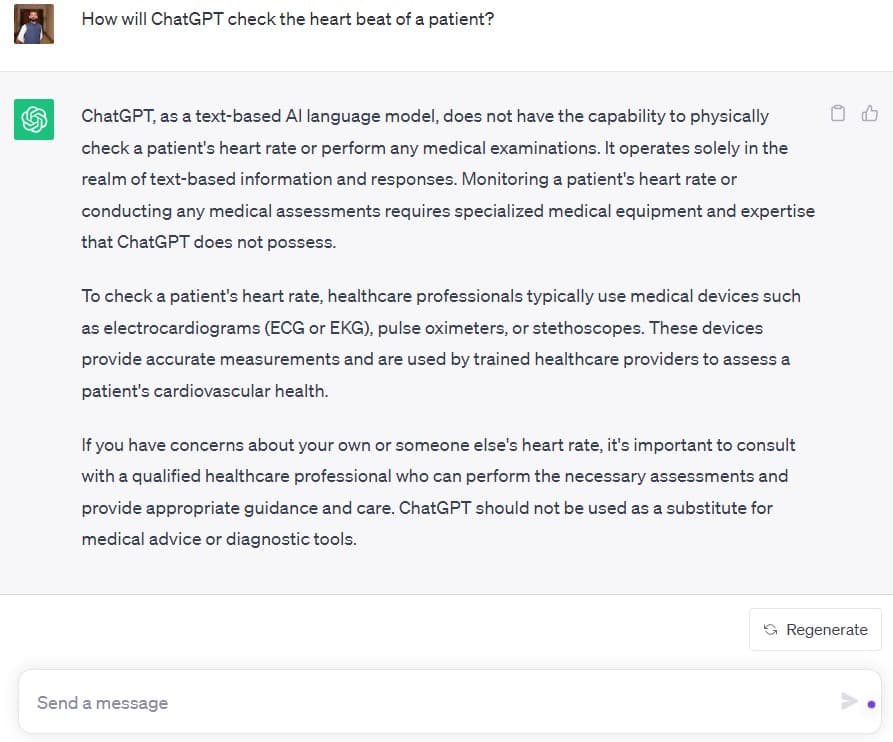
Limited Ability to Interpret Nonverbal Cues
Another drawback of ChatGPT is its limited ability to interpret nonverbal cues. Nonverbal cues, such as facial expressions and body language, can provide important information about a patient’s emotional state and level of understanding.
Limited Ability to Handle Complex Cases
Although ChatGPT can assist with a wide range of tasks, it may not be able to handle complex cases that require extensive knowledge and years of expertise.
Potential for Errors and Bias
Like any artificial intelligence system, ChatGPT is susceptible to errors and bias. If the system is not properly trained or if there are biases in the data it is trained on, it may provide inaccurate or biased information.
Limited Ability to Handle Emergencies
In situations where a patient requires or is experiencing a medical emergency, ChatGPT may not be able to provide the necessary assistance or make quick decisions to tackle such kinds of situations.
Privacy and Security Concerns
ChatGPT may raise privacy and security concerns if it is used to collect and store patient information. Patients may be concerned about the confidentiality of their information, especially if it is being stored in a digital system.
Technical Limitations
The ChatGPT tool may be limited by technical factors such as internet connectivity and hardware limitations. These factors may impact the speed and reliability of the system, as well as its ability to handle large volumes of data.
How ChatGPT Affects Pharmacists Negatively?
While ChatGPT can be a useful tool in pharmacy practice, it can also negatively affect pharmacists.
Reduced Job Opportunities
As ChatGPT is becoming more advanced with the passage of time, it may be able to perform certain tasks that pharmacists previously did. This could potentially lead to a reduction in job opportunities for pharmacists.
Increased Workload
While ChatGPT can assist with some tasks, it may also increase the workload of pharmacists. This is because the system may require frequent updates and maintenance, which can be time-consuming.
Reliance on Technology
With the increased use of ChatGPT in pharmacy practice, there is a risk of pharmacists becoming overly reliant on technology. This could potentially lead to a reduction in critical thinking and problem-solving skills.
Lack of Personal Interaction
ChatGPT may not be able to provide the same level of personal interaction as human pharmacists do. This could potentially lead to a lack of trust between patients and pharmacists.
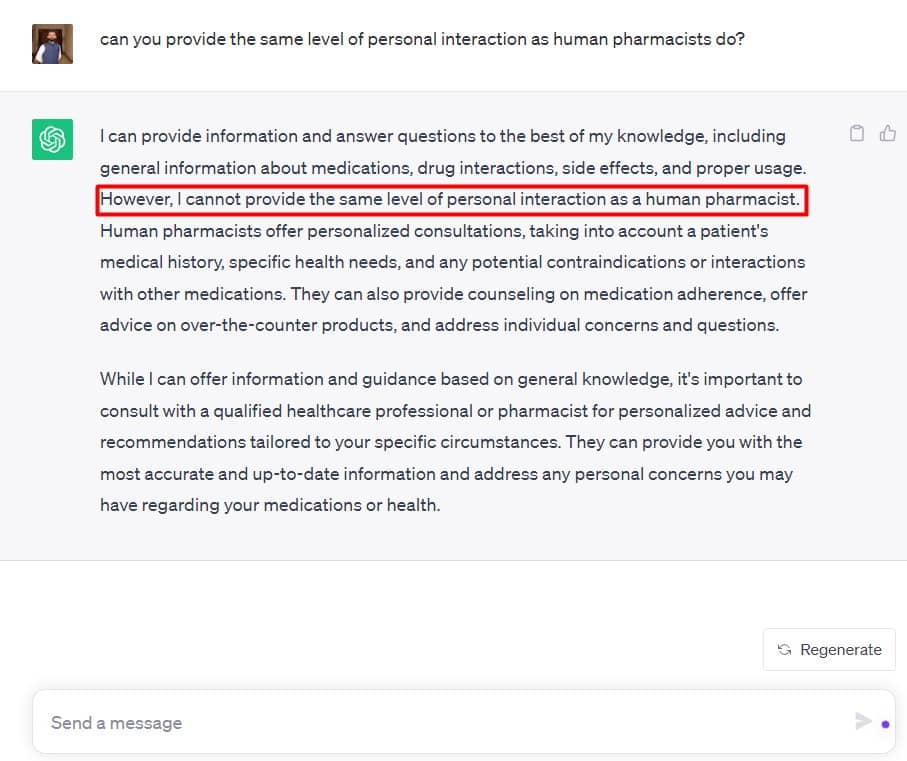
Security Concerns
As with any digital system, there is always a risk of security breaches or data theft. This could potentially lead to the exposure of sensitive patient information or any other security risks.
Cost
Implementing ChatGPT in a pharmacy setting can come with a significant cost. This includes the initial cost of purchasing and installing the system, as well as ongoing maintenance and updates.
Training and Education
Pharmacists and other healthcare professionals must undergo training and education to use and integrate ChatGPT into their practice effectively. This can be time-consuming and require additional resources.
Patient Preferences
While some patients may be comfortable using ChatGPT for certain tasks, others may prefer interacting with a human pharmacist. This can lead to a lack of personalization in care and potentially lower patient satisfaction.
FAQs
Is ChatGPT Healthcare’s Next Big Thing?
ChatGPT has the potential to transform the healthcare industry with its ability to process vast amounts of data and provide quick and accurate responses to patient inquiries.
However, it is important to note that it is still a relatively new technology, and more research is needed to understand its capabilities fully.
Is ChatGPT a Threat in the Healthcare Industry?
ChatGPT is not a threat to the healthcare industry but rather a tool that can assist healthcare professionals in providing better patient care. It is important to use ChatGPT appropriately and to supplement, rather than replace, the expertise of healthcare professionals.
Will Pharmacists Accept ChatGPT?
Pharmacists have already started using ChatGPT in their daily operations to help with tasks such as medication counseling and patient education. With proper training and education, pharmacists can effectively integrate ChatGPT into their practice.
How ChatGPT Benefits Pharmacists?
ChatGPT can benefit pharmacists by assisting with tasks such as medication counseling, drug interaction checks, and patient education. This can free up time for pharmacists to focus on more complex tasks and provide better care to patients.
Will ChatGPT Revolutionize Healthcare?
ChatGPT has the potential to revolutionize healthcare by improving the speed and accuracy of patient care. However, it is important to use ChatGPT appropriately and in conjunction with the expertise of healthcare professionals.
Can ChatGPT Pass a Pharmacy Exam?
ChatGPT is an artificial intelligence language model and is not capable of passing a pharmacy exam on its own. It can, however, provide information and recommendations to help pharmacists make informed decisions.
Can ChatGPT Enhance Experiential Learning for Pharmacy Students?
ChatGPT can enhance experiential learning for pharmacy students by providing them with a tool to practice and refine their skills in medication counseling, drug interaction checks, and patient education.
Can ChatGPT Diagnose Disease?
ChatGPT is not capable of diagnosing diseases on its own. It can, however, provide information and recommendations based on patient symptoms and medical history to help healthcare professionals make informed decisions.